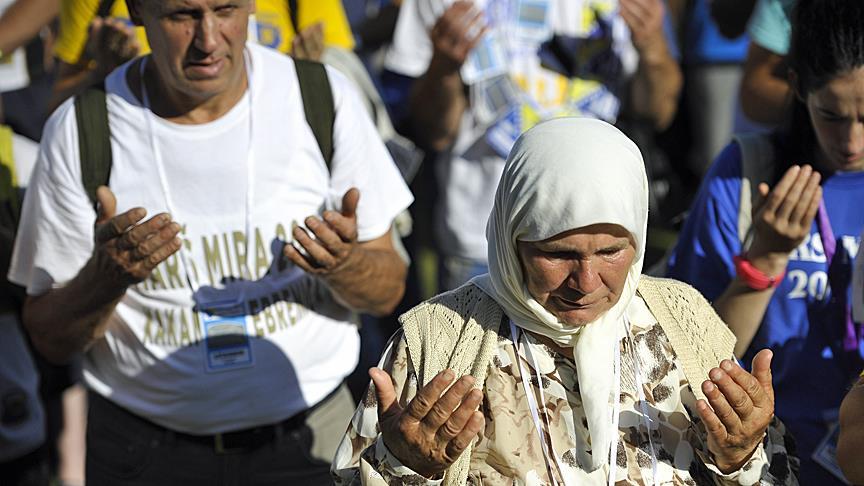 People pray during the March of Peace in Tuzla, Bosnia and Herzegovina on July 8, 2017. More than 5,000 participants from all over the world attended the "March of Peace" (March Mira) from Nezuk town on forest road known "death road" which was used by Bosnians who wanted to escape to to safe zone of Tuzla, to commemorate the victims of the 1995 Srebrenica genocide in which some 8,000 Bosnians were killed. (Samir Yordamoviç - Anadolu Agency)
People pray during the March of Peace in Tuzla, Bosnia and Herzegovina on July 8, 2017. More than 5,000 participants from all over the world attended the "March of Peace" (March Mira) from Nezuk town on forest road known "death road" which was used by Bosnians who wanted to escape to to safe zone of Tuzla, to commemorate the victims of the 1995 Srebrenica genocide in which some 8,000 Bosnians were killed. (Samir Yordamoviç - Anadolu Agency)
By Talha Ozturk
BELGRADE, Serbia
Thousands of people from all over the world set off Saturday on a three-day peace march in Nezuk town near the Bosnian city of Tuzla to commemorate the 22nd anniversary of the Srebrenica genocide.
More than five thousand participants, who began gathering at the town since the early morning hours, will cover a total distance of approximately 100 kilometers (62 miles). The walk is expected to conclude at a cemetery in Potocari, a village in eastern Bosnia-Herzegovina, just northwest of Srebrenica town, where a funeral prayer and burial ceremony will be held for 71 genocide victims.
Participants will travel about 35 km each day to reach Potocari within the scope of the "Peace March" organized for the 13th time this
'People from all over the world are participating'
Camil Durakovic, chairman of the organizing committee, said that the peace march had turned into a global activity.
"People from all over the world are participating [in the walk] alongside the children and the grandchildren of those who were killed in 1995. The purpose of the peace march is to experience at least a bit of what Srebrenica victims went through on this path," said Durakovic.
Munir Habibovic, one of the representatives of the organizing committee, said that five to seven thousand people were expected to attend the
One of the participants, Edin
"I am participating
Since 2005, thousands of people have attended the Mars Mira (which means Peace March in local Bosnian language), which follows the same forest path that was used by Bosniaks when they were fleeing the Srebrenica genocide. The path from Srebrenica to Tuzla is commonly known as the "Death Road".
Srebrenica was besieged by Serb forces between 1992 and 1995 during the Bosnian War. Back then, Serb militias were trying to wrest territory from Bosnian Muslims and Croats to form their own state.
The UN Security Council had declared Srebrenica a "safe area" in the spring of 1993. However, Serb troops led by General Ratko Mladic – who now faces genocide charges at The Hague – overran the UN zone despite the presence of around 450 Dutch soldiers tasked with protecting innocent civilians as UN peacekeepers.
The Dutch troops failed to act as Serb forces occupied the area, killing about 2,000 men and boys on July 11 alone. Some 15,000 Srebrenica men fled into the surrounding mountains but Serb troops hunted down and slaughtered 6,000 of them in the forests.
A total of 6,504 victims


